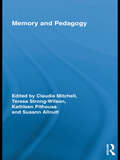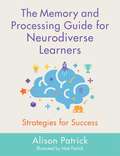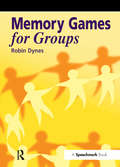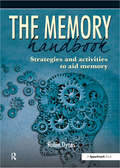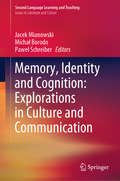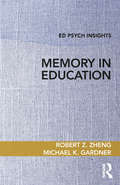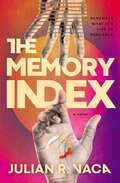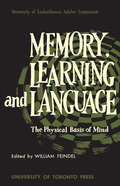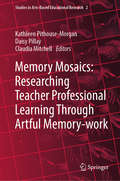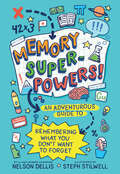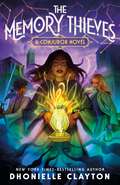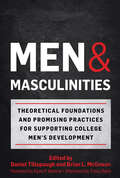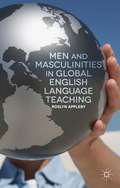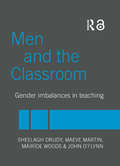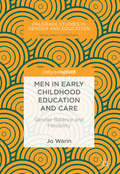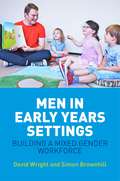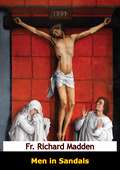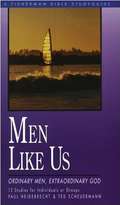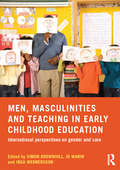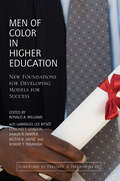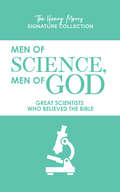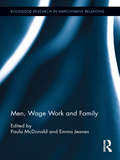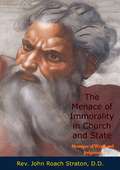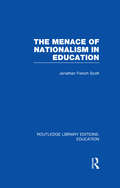- Table View
- List View
Memory and Pedagogy (Routledge Research in Education)
by Claudia MitchellMemory work – the conscious remembering and study of individual and shared memories – is increasingly being acknowledged as a key pedagogical tool in working with children. Giving students opportunities and support to remember and study their selves as individuals and as communities allows them to see their future as something that belongs to them, and that they can influence in some way for the better. This edited volume brings together essays from scholars who are studying the interconnections between pedagogy and memory in the context of social themes and social inquiry within educational research. The book provides a range of perspectives on the social and pedagogical relevance of memory studies to the educational arena in relation to the themes of memory and method, revisiting childhood, memory and place, addressing political conflict, sexuality and embodiment, and inter-generational studies.
The Memory and Processing Guide for Neurodiverse Learners: Strategies for Success
by Alison PatrickArmed with the wealth of understanding and strategies in this guide, students will discover how they can learn best, to make studying and revision more effective (and less stressful).Packed with simple, tried and tested strategies and workarounds, this study guide for supporting kids and teens who learn differently (such as those with ADHD, dyslexia, dyspraxia or ASD) explains what memory and processing issues are, and how to work around them. Written by a tutor and specialist with years of experience of working with students with learning differences, this book enables the student to understand the best ways they learn and the reasons behind this. Unpacking processing speed, sensory processing, metacognition, and executive functioning, including working memory, this uniquely relatable and empowering study guide will provide students with the self-understanding they need to manage exams and academic tasks at school with confidence and peace of mind.
Memory Games for Groups
by Robin DynesThis wonderfully practical handbook features 80 adaptable and photocopiable games for uses with older people, as well as individuals or groups of all ages. The games can be used as part of a social activities programme, specifically for reminiscence purposes, to help keep people orientated to the world around them, to exercise memory skills or as the prelude to discussion, so that individuals can share difficulties and explore methods of aiding memory.
The Memory Handbook: Strategies and Activities to Aid Memory
by Robin DynesThis is a handbook full of practical ideas to use with anyone who is experiencing mild to severe memory difficulties. The suggestions and activities can be used when working with individuals or groups. The strategies can, in fact, be used by anyone young or old, who has become worried about loss of memory. The handbook provides: information about how memory works and different types of memory; an outline of what can affect memory; strategies to aid memory; activities to practice using the strategies; and activities to keep the brain active and maintain memory. The resource is aimed at staff in care environments such as residential homes, day centres, social clubs, support groups, carers or anyone who might be concerned about loss of memory. It promotes understanding about memory difficulties and provides a wide range of strategies and activities to aid response to individual need. Approximately 200pp; A4 wire-o-bound.
Memory, Identity and Cognition: Explorations in Culture and Communication (Second Language Learning and Teaching)
by Michał Borodo Jacek Mianowski Paweł SchreiberThe book analyses a variety of topics and current issues in linguistics and literary studies, focusing especially on such aspects as memory, identity and cognition. Firstly, it discusses the notion of memory and the idea of reimagining, as well as coming to terms with the past. Secondly, it studies the relationship between perception, cognition and language use. It then investigates a variety of practices of language users, language learners and translators, such as the use of borrowings from hip-hop and slang. The book is intended for researchers in the fields of linguistics and literary studies, lecturers teaching undergraduate and master’s students on courses in language and literature.
Memory in Education (Ed Psych Insights)
by Robert Z. Zheng Michael K. GardnerAs our understanding of the human memory system broadens and develops, new opportunities arise for improving students’ long-term knowledge retention in the classroom. Written by two experts on the subject, this book explores how scientific models of memory and cognition can inform instructional practices. Six chapters guide readers through the information processing model of memory, working and long-term memory, and Cognitive Load Theory (CLT) before addressing instructional strategies. This accessible, up-to-date volume is designed for any educational psychology or general education course that includes memory in the curriculum and will be indispensable for student researchers and both pre- and in-service teachers alike.
The Memory Index (The Memory Index #1)
by Julian Ray VacaIn this electric speculative YA sci/fi novel, the world treats memories like currency, so dreams can be a complicated business. Perfect for fans of Neal Stephenson and Philip K. Dick.In an alternative 1987, a disease ravages human memories. There is no cure, only artificial recall. The lucky ones—the recollectors—need the treatment only once a day.Freya Izquierdo isn&’t lucky. The high school senior is a &“degen&” who needs artificial recall several times a day. Plagued by blinding half-memories that take her to her knees, she&’s desperate to remember everything that will help her investigate her father&’s violent death. When her sleuthing almost lands her in jail, a shadowy school dean selects her to attend his Foxtail Academy, where five hundred students will trial a new tech said to make artificial recall obsolete.She&’s the only degen on campus. Why was she chosen? Freya is nothing like the other students, not even her new friends Ollie, Chase, and the alluring Fletcher Cohen. Definitely not at all like the students who start to vanish, one by one. And nothing like the mysterious Dean Mendelsohn, who has a bunker deep in the woods behind the school.Nothing can prepare Freya and her friends for the truth of what that bunker holds. And what kind of memories she&’ll have to access to survive it.&“Vaca&’s debut is a thrilling and often unsettling examination of the elusive nature of memory and truth. The Memory Index will leave you breathlessly turning pages until its satisfying conclusion.&” —Jonathan Evison, New York Times bestselling author of Small WorldGet hooked on The Memory Index Duology:Book 1: The Memory IndexBook 2: The Recall Paradox (coming Spring 2023)
Memory, Learning and Language: The Physical Basis
by William FeindelThe symposium was arranged with the purpose of cutting across some of the lines dividing various disciplines all having a common interest in different aspects of the functioning of the brain. The essays, given originally as lectures at one of the Jubilee celebrations of the University of Saskatchewan, were deliberately designed to be of interest to laymen concerned with the problem of education as well as to academics dealing daily with products of the brain's activity in teaching and learning. One of the main themes of the book is that the human brain has far greater potentialities than our present methods of education are exploiting; another is that, although our universities can be said to owe their very existence to the multiplex activities of the human mind, the subject of how the brain functions and the application of even our rather meagre knowledge of this field to the sphere of teaching and learning remains greatly neglected in university programmes. The subject of brain function, studied daily by the neurologist and neuro-surgeon, should gain the interest of non-medical fields concerned with utilizing the mechanism of the mind.
Memory Mosaics: Researching Teacher Professional Learning Through Artful Memory-work (Studies in Arts-Based Educational Research #2)
by Kathleen Pithouse-Morgan Daisy Pillay Claudia MitchellThis book communicates new voices, insights, and possibilities for working with the arts and memory in researching teacher professional learning. The book reveals how, through the arts, teacher-researchers can reimagine and reinvigorate moments of the past as embodied and empowering scholarly experiences. The peer-reviewed chapters were composed from juxtaposing unique “mosaic” pieces written by 21 new and emerging scholars in South Africa and Canada. Their research explores diverse arts-based practices and resources including collage, film, drawing, narrative, poetry, photography, storytelling and television alongside related ethical issues. Critically, Memory Mosaics also demonstrates how artful memory-work can engender agency in professional learning with teacher-researchers taking up pressing issues of social justice such as inclusion and decolonisation. Overall, the book offers a multidimensional, polyvocal exploration of how artful memory-work can bring about future-oriented professional learning enacted as pedagogies of reinvention and productive remembering.Memory Mosaics: Researching Teacher Professional Learning Through Artful Memory-Work, by Kathleen Pithouse-Morgan, Daisy Pillay, and Claudia Mitchell, along with teacher-researchers on two continents, is a ground-breaking book. It models a collaborative approach to arts-based research that melds memory-work, visual and poetic arts, and reflective practice to promote professional learning, personal transformation, decolonisation, and a more just future. Like colourful pebbles and bits of glass, the authors place teachers’ self-stories in relation to one another in an artful design, creating thematic coherence that evokes a deep sense of knowing. Judith C. Lapadat, Professor Emeritus, Faculty of Education, University of Lethbridge, CanadaMemory Mosaics: Researching Teacher Professional Learning Through Artful Memory-Workassembles exemplars of professional learning in an intriguing mosaic format. A topic is introduced, followed by memory-pieces; then: discussion and/or creative response. This lively juxtaposition generates momentum for highly productive forms of remembering around social justice issues, even as the reader is invited into an intimate circle of shared concern: for these issues, with these (and other) teacher-researchers. It is a beautiful, original, and practical book. Teresa Strong-Wilson, Associate Professor, Faculty of Education, McGill University, Canada
Memory Superpowers!: An Adventurous Guide to Remembering What You Don't Want to Forget
by Nelson DellisA kid’s guide to amazing feats of memorization with “a variety of engaging memory exercises [and] methods for all different types of learners.” —Kirkus ReviewsNelson Dellis, the four-time USA Memory Champion, reveals the secrets to his phenomenal ability to remember almost anything. From presidents to state capitals, from mathematical theorems to the periodic table, kids have so much to remember for school!This incredibly helpful book is structured as an entertaining and fantastical narrative in which the author guides the reader as they attempt to climb Mount Foreverest. Up there, the goal is to defeat the Memory Thief, a villain plotting to steal everyone’s memories. On the journey, while encountering pirates, forest dwarves, and mummies, you’ll also find tools and tricks to remember the US presidents in order, foreign word meanings, countries and capitals, the periodic table, long numbers, and multiplication tables. These easily understandable exercises can help build skills to remember any kinds of words, lists, numbers, or concepts. Whether you’re trying to become a better student or just want to amaze friends and family, Memory Superpowers! is one unforgettable book.“[Steph] Stilwell’s bright illustrations accompany this book that’s full of useful tips that will help students enjoy learning to study better.” ?Booklist
The Memory Thieves (The Conjureverse Series #2)
by Dhonielle ClaytonThe fantasy adventure sequel to the instant New York Times and #1 Indie Bestseller, The Marvellers by Dhonielle Clayton! Return for Year Two at the global magic school in the sky in The Memory Thieves."The Marvellers deserves the highest compliment I can give a book: I want to live in this world." —Rick Riordan, #1 New York Times bestselling–author Eager to wield their stapiers for Marvel Combat, Ella, Brigit, and Jason are back for their second year at the Arcanum Training Institute. With Ella’s celebrity growing throughout the Marvellian world after thwarting the Ace of Anarchy’s diabolical plans, it’s proving hard for her to focus on her coursework. But back home in New Orleans the Conjure community isn’t too happy about her return to the skies for another year learning to become a Marveller. As if life wasn’t complicated enough, Ella soon discovers more dangerous secrets about the Conjure architect who built the school.Before she can dig deeper, a mysterious magical illness sweeps through the Institute, and Ella lands at the top of the suspect list. Can Ella and her friends save themselves and the Marvellian world before chaos breaks loose?
Men and Masculinities: Theoretical Foundations and Promising Practices for Supporting College Men's Development
by Daniel Tillapaugh, Brian L. McGowan, Ryan P. Barone, Tracy DavisThere continues to be much concern about the retention and persistent of men in college, particularly Black, Latinx, and Native American men. In addition, queer and trans* men also have found institutions to be problematic spaces. For those who do persist, we know that men are overrepresented in student conduct cases and engage in risky behaviors around alcohol, drug use, and sexual relationships. Additionally, we know that college men have historically avoided engaging in help-seeking behaviors for their academic and personal success. This book addresses the ways that theory can be put into practice for powerful, transformative learning to support college men and their development.This book synthesizes the research of the past three decades on college men to inform college student educators on the developmental needs of college men and illuminates how young men are socialized prior to their arrival to campus, but perhaps more importantly, how the collegiate environment becomes a training ground for the socialization of masculinities by students, their peers, and their environments.Beyond that, it sets out how practitioners can help young men understand why and how they have been socialized around their gender identity, but also what their gender identity and sense of masculinity means for their future selves. The book highlights programs and services designed to have college men engage with and dialogue around issues of hegemonic, toxic, or unhealthy aspects of masculinity. These promising practices can offer college men opportunities to understand their power, privilege, and identity in ways that can be affirming and healthier, leading to more life-giving chances. This is all the more important in the context of an ever-evolving society where traditionally held norms and expectations around gender--particularly masculinities--are shifting. This book equips student affairs staff, faculty, and administrators to better support college men’s development. It offers readers insights, ideas, and models for adapting and developing programs, services, and initiatives that may meaningfully meet the needs of specific student populations, while recognizing that there is no “one-size-fits-all” approach to this work.
Men and Masculinities in Global English Language Teaching
by Roslyn ApplebyThis book draws on a range of sources, including tales of castaways, fictional narratives, and interviews with teachers in conversation schools and universities in Japan, to explore many current concerns around teacher identity, gender, and intercultural sexuality in global English language teaching.
Men and the Classroom: Gender Imbalances in Teaching
by Sheelagh Drudy Maeve Martin John O'Flynn Mairide WoodsThe teaching of young children has long been dominated by women. This global phenomenon is firmly rooted in issues related to economic development, urbanization, the position of women in society, cultural definitions of masculinity and the values of children and childcare. Yet, amongst the media scare stories and moral panics about underachieving boys, there are surprisingly few empirically-supported answers to vital questions such as: Is the feminisation of teaching really a problem? How is the relationship of gender and teaching considered within a framework of feminist theory? What are the perceptions of students of teaching, in comparison to other professions? Why are so few men attracted to teaching? Can more men be attracted into the classroom? The authors of this groundbreaking book have undertaken the largest, most in-depth study ever carried out on this topic, in order to assess both teachers and students' views across primary education.
Men at Leisure
by Bruce FredericksonGodly Man series/examines men at leisure from Biblical perspective
Men in Early Childhood Education and Care: International Perspectives On Gender And Care (Palgrave Studies in Gender and Education)
by Jo WarinThis book examines the current interest in recruiting and supporting more men in the early childhood education workforce. Drawing on extensive empirical data from case studies of an unusual English preschool setting and interviews with Swedish male preschool staff, the author explores the potential benefits to society linked to the increased presence of men in early childhood education, and how this might be achieved. Throughout the book, the author maintains that the potential of including more men in early childhood education can only be achieved by gender-sensitive practitioners, both women and men, who are willing to create a gender-flexible pedagogy. This volume will be of interest and value to students, academics and practitioners interested in gender diversity and equity within early childhood education and care.
Men in Early Years Settings: Building a Mixed Gender Workforce
by David Wright Simon BrownhillThis book explores the role of male professionals in early years settings and provides guidance for early years practitioners, managers and policy makers on building a more mixed-gender workforce by successfully attracting, recruiting, retaining and developing men in their teams.Men make up less than 2% of the early years workforce in England. This book considers the reasons for the current situation, asks whether there is a case for change and suggests ways of achieving a more mixed-gender early years workforce. The voices of male and female practitioners, providers and parents help to illustrate the barriers to men entering and successfully working in the sector, whilst also suggesting ways these barriers can be broken down.
Men in Sandals
by Fr. Richard MaddenThis, to put it bluntly, is a book about Discalced Carmelites. I write about them because, although people are interesting, Discalced Carmelites are more interesting than people. I write about them, too, because I know more about this subject than I know about any other.This book is not an analysis of their sanctity. It is not an insight into the deep recesses of their spiritual life. Nor can it, in any way, be classified as Carmelite literature because it falls far short of the high standards set by our holy parents, St. Teresa of Avila and St. John of the Cross. This book is simply an effort to convey the fact that, although religious life may not always be easy, there is nothing quite so satisfying. It is not a dreary thing. It is not a world wherein somber, brown-robed men straggle through dingy vaulted corridors. It is not a life of long faces and sad hearts. Rather, it is a kingdom that rarely feels the draughts of true sorrow. Lived with, and in imitation of Christ, it could only be, even in its essence, a life of honest joy.
Men Like Us: Ordinary Men, Extraordinary God (Fisherman Bible Studyguide Series)
by Paul Heidebrecht Ted ScheurmannMen Like Us presents 13 studies for individuals and groups.
Men, Masculinities and Teaching in Early Childhood Education: International perspectives on gender and care
by Simon Brownhill Jo Warin Inga WernerssonThis stimulating book sets out to critically explore the notion of men, masculinities and teaching in early childhood education. It addresses the global pattern of gender, teaching and care where men are in the minority, and explores the notion that the greater involvement of men within teaching and associated professions has the potential to transform gender relations for future generations. International contributors raise critical questions about the construction of masculinities, the continuing reluctance of men to engage in this type of work, and the influence of political and public debates on the issue. Through this engaging discussion readers are asked to question whether this is something that we should care about, with key topics including: The roles of men in education and care Teachers’ beliefs, norms and values of gender equality The construction of male identities Gendered ideals, and children’s interpretations of gender. Men, Masculinities and Teaching in Early Childhood Education brings together a refreshing and critical set of perspectives linked to an increasingly important educational debate and will be a valuable text for practitioners, professionals, policy makers and parents/carers.
Men of Color in Higher Education: New Foundations for Developing Models for Success
by Freeman A. Hrabowski III Ronald A. Williams LeManuel Lee Bitsóí Edmund T. Gordon Shaun R. Harper Victor B. Sáenz Robert T. TeranishiGiven the continued plight of men of color in college after a decade of ineffective interventions focused more on “fixing the student” than on addressing the social, structural and institutional forces that undermine his academic achievement, this book is intended as a catalyst to change the direction of the dialogue, by providing a new theoretical framework and strength-based models for developing strategies for success.This book brings together five of today’s leading scholars concerned with the condition of males of color in higher education – LeManuel Bitsóí, Edmund T. Gordon, Shaun Harper, Victor Sáenz and Robert Teranishi, who collaborated closely through of a series of conversations convened by the College Board to diagnose the common factors impeding the success of under-represented males and to identify the particular barriers and cultural issues pertaining to the racial and ethnic groups they examine.This cohesive volume starts with the recognition that understanding males' disengagement from the classroom requires determining what it means to be a male in a non-dominant group in today’s society. The authors use the methods of feminist theory to uncover the impact of dominant paradigms of White, middle-class, heteronormative masculinity on men of color in general, to define what comprises masculinity for various groups, subgroups and individuals, and to lay bare the social and institutional forces that perpetuate constructions of masculinity that negatively impact men of color. They demonstrate that researchers and practitioners alike must pay more careful attention to within-group diversity as they study college men of color and create initiatives that respond to their varied needs. They establish the need for men of color campus initiatives to be mindful of the masculinities with which students enter college, as well as how they develop, negotiate and perform their gender identities on campus; the vital importance, in developing programs and interventions, of addressing the sociological undercurrents of men’s bad behaviors and poor help-seeking tendencies; and for providing opportunities for men to engage in critical individual and collective reflection on how they have been socialized to think of themselves as men.This book advances the critical priorities of increasing enrollments and completion rates among college men of color, and of graduating well-developed men with strong, conflict-free gender identities. For practitioners who work with these populations, it offers insights and signposts to create successful programs; for researchers it offers a set of new directions for analysis; and for policymakers, new ways of thinking about how policy and funding mechanisms ought to be reconsidered to be more effective in responding this issue.
Men of Science, Men of God: Great Scientists Who Believed the Bible (The Henry Morris Signature Collection)
by Henry MorrisScientists choose whether they will believer God's word or discount it. Explore over 101 biographies of groundbreaking, influential scientists with their Christian testimonies See how the belief in a Creator inspired the earliest explorations of science and still impacts the work of Bible-believing scientists todayScience and faith are often considered incompatible in the academic world today. One is seen as representing truth, while the other is viewed as fanciful according to the skeptical, science-centered culture. But the reality is that thousands of scientists, in fact, many of science’s greatest “founding fathers,” believed openly in God as they worked and studied His created world. Learn how their discoveries led them to even greater depths of faith and how their beliefs influenced and inspired their work.There is nothing in science that can ever prove that God does not exist and, therefore, no way that science can disprove Creation. For so many in the past, the answer was that their faith was inseparable from their science, a powerful point to encourage believers and challenge the skeptics.
Men, Wage Work and Family (Routledge Research in Employment Relations)
by Paula McDonald Emma JeanesIn the last two decades there has been a plethora of research on a range of subjects collectively and rhetorically known as ‘work-life balance’. The bulk of this research, which spans disciplines including feminist sociology, industrial relations and management, has focused on the significant concerns of employed women and/or dual career couples. Less attention has been devoted to scholarship which explicitly examines men and masculinities in this context. Meanwhile, public and organizational discourse is largely espoused in gender neutral terms, often neglecting salient gendered issues which differentially impact the ability of women and men to successfully integrate their work and non-work lives. This edited book brings together empirical studies of the work-life nexus with a specific focus on men’s working time arrangements, how men navigate and traverse paid work and family commitments, and the impact of public and organizational policies on men’s participation in work, leisure, and other life domains. The book is innovative in that it presents both macro (institutional, how policy affects practice) and micro (individual, from men’s own perspectives) level studies, allowing for a rich and contrasting exploration of how men’s participation in paid work and other domains is divided, conflicted, or integrated. The essays in this volume address issues of fundamental social, labor market, and economic change which have occurred over the last 20 years and which have profoundly affected the way work, care, leisure and community have evolved in different contexts. Taking an international focus, Men, Wage Work and Family contrasts various public and organizational policies and how these policies impact men’s opportunities and participation in paid work and non-work domains in industrialised countries in Europe, North America, and Australia.
The Menace of Immorality in Church and State: Messages of Wrath and Judgment
by John D.“THE following messages are printed in response to many requests for their publication. I have allowed the local coloring to remain in the discourses, because I felt that these elements might add to the vitality of the messages, and make them more concrete and real.“I have not softened the messages, either, by ‘retouching’ them. These messages were stenographically reported, and they are given here just as God gave them to the messenger,—hot from the heart.“Happily, however, we are getting away from that false modesty which is not willing to talk about these evils, in order that they may be exposed and corrected, but is willing to tolerate them in guilty and shameful silence. We need to substitute the challenging tones of truth for this cowardly and prudish reserve. We need to speak out. We need knowledge of these secret enemies of our homes. These evils feed on silence and grow by stealth, and we ought today to tell the whole truth and not compromise with evil. ‘Ye shall know the truth and the truth shall make you free.’ As in Hosea’s day, thousands and tens of thousands are being ‘destroyed for lack of knowledge.’ Men and women, boys and girls,—our children, our brothers and our sisters,—are going down. Surely it is our duty to unmask the sources of their destruction, and to seek by all honest and legitimate means to defend ourselves against these secret assailants of the sanctity of the church, the purity of the home, the good order of the state, and the very life of the nation itself.After every war, there is a wave of immorality. We have just passed through the greatest war of all time, and we are now witnessing the widest wave of immorality in the history of the human race. Like a consuming fire, it is sweeping over the world. Only a spurious and silly optimism can deny this fact. All who really know conditions, both in Europe and America, confirm the fact.”—Rev. John Roach Straton
The Menace of Nationalism in Education (Routledge Library Editions: Education)
by Jonathan Scott FrenchWritten between the two World Wars this volume examines education from the American, British, French & German perspectives and the degree to which the portrayal of those countries in school textbooks contributes to nationalism or world peace.
